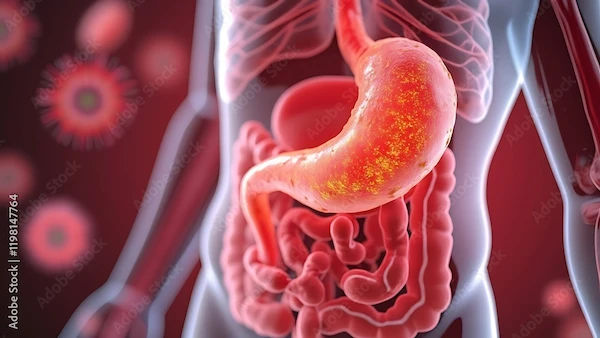How to Reduce Free Radicals in the Body?
Learn how to reduce free radicals in the body naturally with antioxidant-rich foods, lifestyle changes, and essential health tips to combat oxidative stress and promote overall well-being.

Written by
Last updated on 3rd Jul, 2025
Introduction
Free radicals are reactive molecules that can cause serious harm to our cells, proteins, and even DNA. This damage is linked to a wide variety of health problems, from chronic diseases to premature ageing. While free radicals are a normal by-product of our body's metabolism, things like pollution, smoking, radiation, and a poor diet can cause their numbers to skyrocket. The good news is that there are practical steps we can take to reduce free radicals in our body and lower their harmful effects. This article dives into some of the most effective ways to do just that.
What Are Free Radicals?
Free radicals are molecules that have one or more unpaired electrons. Because they’re unstable, free radicals try to ‘steal’ electrons from nearby molecules, which in turn causes damage. This is what we call oxidative stress. Normally, our bodies can handle free radicals, but when the balance between free radicals and antioxidants (the good guys) tips in favour of free radicals, damage starts to occur. Over time, this can lead to various health problems such as heart disease, cancer, and even cognitive decline.
Why Antioxidants Are So Important
Antioxidants are substances that neutralise free radicals, stopping them from causing harm. The body produces some antioxidants naturally, but many of the most important ones come from the foods we eat. A diet rich in antioxidants helps prevent oxidative stress, reduce the risk of chronic illness, and slow down the signs of ageing.
Eat More Antioxidant-Rich Foods
One of the easiest and most effective ways to combat free radicals is through your diet. By including antioxidant-rich foods in your meals, you can help your body stay balanced and fight oxidative damage. Fruits, vegetables, nuts, and whole grains are great sources of antioxidants, and a variety of these will give your body what it needs to stay healthy. Here’s a look at some of the best foods to help you do this:
1. Berries
Blueberries, strawberries, raspberries, and blackberries are packed with anthocyanins, a type of antioxidant that is especially effective at fighting free radical damage. Berries also contain high levels of vitamin C, which boosts your immune system and helps protect your skin.
2. Leafy Greens
Spinach, kale, and broccoli are great sources of lutein and zeaxanthin—antioxidants that protect your eyes and fight oxidative stress. These greens are also full of fibre, which supports gut health.
3. Nuts and Seeds
Nuts like almonds and walnuts, as well as sunflower seeds, are rich in vitamin E, which is a powerful antioxidant that protects cell membranes and slows the ageing process. These also provide healthy fats that are good for your heart.
4. Colourful Veggies
Brightly coloured vegetables like carrots, sweet potatoes, and bell peppers are full of beta-carotene, a type of vitamin A that neutralises free radicals. Their vivid colours are a good clue that they’re packed with antioxidants!
5. Green Tea
Green tea is well-known for its powerful antioxidants called catechins, which can improve heart health and reduce the risk of certain cancers. Drinking a cup of green tea daily is a simple way to boost your antioxidant intake.
6. Dark Chocolate
Yes, dark chocolate! It’s rich in flavonoids, a type of antioxidant that helps protect your body from oxidative stress. Choose high-quality dark chocolate with at least 70% cocoa for the maximum benefit.
Cut Down on Environmental Toxins
The environment we live in can greatly impact our exposure to free radicals. Things like pollution, cigarette smoke, and UV radiation increase the production of these harmful molecules. While it’s impossible to avoid all of these factors, there are ways to minimise your exposure.
1. Quit Smoking (or Avoid Secondhand Smoke)
Cigarette smoke is a major contributor to free radical damage. It not only harms the lungs but also increases oxidative stress throughout the body. If you smoke, quitting is one of the most effective ways to reduce free radicals. And if you’re around smokers, try to avoid secondhand smoke as much as possible.
2. Limit Exposure to Air Pollution
Air pollution from car exhaust, industrial emissions, and dust particles can lead to higher levels of free radicals in the body. If you live in an area with poor air quality, staying indoors on high-pollution days can help. An air purifier at home can also help clear the air.
3. Protect Your Skin from the Sun
Too much sun exposure can trigger the production of free radicals in your skin, leading to premature ageing and an increased risk of skin cancer. Make sure to wear sunscreen with a high SPF, seek shade when the sun is at its peak, and wear protective clothing if you plan to be outside for extended periods.
Exercise Regularly
While intense exercise can temporarily increase free radical production, regular moderate exercise actually helps improve the body’s antioxidant defences. This makes your body more resilient to oxidative stress over time. Aim for at least 150 minutes of moderate exercise per week—whether it’s walking, cycling, swimming, or yoga.
Manage Stress
Chronic stress can also contribute to an increase in free radicals, as stress triggers inflammation in the body. Managing stress is an essential part of reducing oxidative damage. Here are some simple ways to manage stress effectively:
1. Practice Mindfulness Meditation
Spending just 10-15 minutes a day meditating can help lower cortisol (the stress hormone) and boost antioxidant levels. Regular mindfulness practice can improve your mood and reduce stress-induced free radical production.
2. Deep Breathing
Deep breathing exercises can calm your nervous system and reduce the effects of stress on your body. Simple techniques like diaphragmatic breathing are an easy way to lower free radical levels while increasing your sense of calm.
3. Try Yoga
Yoga combines physical postures with deep breathing, making it a great way to relieve stress. Yoga has been shown to help reduce oxidative stress and improve mental clarity, too.
Get Enough Sleep
Quality sleep is crucial for the body to repair itself. During sleep, your body works to repair cells that have been damaged by free radicals. If you don’t get enough sleep, your body’s ability to handle oxidative stress decreases. Aim for 7-9 hours of sleep each night for optimal health and rejuvenation.
Consider Antioxidant Supplements
If you struggle to get enough antioxidants through your diet, supplements can help. Some common antioxidants to consider include:
Vitamin C
Vitamin E
Coenzyme Q10 (CoQ10)
Curcumin (from turmeric)
Resveratrol (from red wine and grapes)
Before adding supplements to your routine, it’s important to talk to a doctor to avoid excessive intake, which could have negative effects.
Support Gut Health with Probiotics
The health of your gut is crucial for overall well-being—and it plays a significant role in reducing free radicals. An imbalance in your gut microbiome can increase inflammation and oxidative stress. This is where probiotics come in. These beneficial bacteria help balance your gut flora, which can lead to better digestion, improved immune function, and reduced free radical production.
1. How Probiotics Help?
Probiotics help to promote a healthy gut microbiome, reducing inflammation and oxidative damage. They also support immune function, which can lower the risk of infections and chronic diseases associated with free radical damage.
2. Probiotic-rich Foods
Include more probiotic-rich foods in your diet, such as:
Yogurt with live cultures
Kefir
Kimchi
Sauerkraut
Miso
Pickles (fermented in brine, not vinegar)
Supporting your gut health with probiotics is a simple way to help your body stay balanced and reduce oxidative stress.
Maintain a Healthy Weight
Carrying excess weight increases oxidative stress, making it harder for the body to manage free radicals. Maintaining a healthy weight through a balanced diet and regular exercise can significantly reduce your risk of oxidative damage and improve overall health. Even small amounts of weight loss can lower free radical production and improve antioxidant function.
Stay Hydrated
Drinking enough water helps flush out toxins from the body, keeping your organs in top shape and supporting the removal of free radicals. Aim to drink around 8 cups (2 litres) of water per day to keep your body properly hydrated.
Conclusion
Free radicals are a natural by-product of metabolism, but when their levels rise, they can cause significant damage. By making simple lifestyle changes such as eating a diet full of antioxidants, exercising regularly, managing stress, getting enough sleep, and supporting gut health with probiotics, you can lower oxidative stress and protect your cells. While you can’t completely eliminate free radicals, these steps will help reduce their impact, allowing you to enjoy better health and a more vibrant life.
Consult Top Gastroenterologist
Consult Top Gastroenterologist

Dr. Chethan T L
General Physician/ Internal Medicine Specialist
5 Years • MBBS, MD, DNB (General Medicine)
Bengaluru
Apollo Medical Center, Marathahalli, Bengaluru

Dr. Soham Doshi
Gastroenterology/gi Medicine Specialist
8 Years • MD medicine DNB Gastroenterology fellowship in Liver Transplant
Nashik
Apollo Hospitals Nashik, Nashik

Dr. Sunil Kaul
General Surgeon
30 Years • MBBS, MS, FICS, FIMSA, FMAS
Delhi
Apollo Hospitals Indraprastha, Delhi
(25+ Patients)

Dr. Prashant Kumar Rai
Gastroenterology/gi Medicine Specialist
9 Years • MBBS. MD, DM (Gastroenterology)
Guwahati
Apollo Excelcare Hospital, Guwahati
(100+ Patients)

Prof. Dr. M S Revathy
Gastroenterology/gi Medicine Specialist
22 Years • MBBS, MD(GM), DM (Med. Gastro)
Chennai
Apollo Hospitals Greams Road, Chennai
(225+ Patients)



